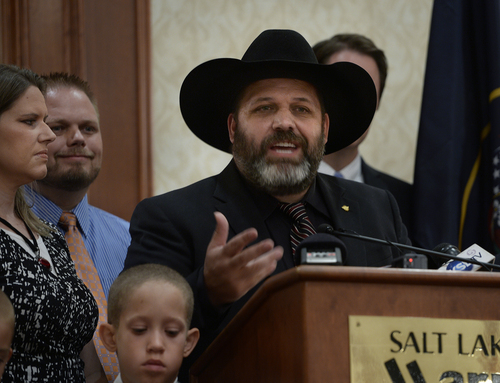This is an archived article that was published on sltrib.com in 2014, and information in the article may be outdated. It is provided only for personal research purposes and may not be reprinted.
A week ago, businessman Rick Koerber stood accused of perpetrating one of the biggest frauds in Utah history, a Ponzi scheme that took $48 million from Utahns' investment savings and retirement accounts.
But by week's end, Koerber was no longer criminally charged.
It was a remarkable turn of events, made more so by the claims that followed U.S District Judge Clark Waddoups' ruling. The judge dropped the case with prejudice, meaning the case can't be refiled. But the ruling and accusations that followed beg many questions, including: What exactly happened here? Why did such a high-profile case, which federal prosecutors spent half a decade preparing, not end with a legal resolution deciding Koerber's innocence or guilt?
The judge dismissed all 18 charges of fraud, money laundering and tax offenses because federal prosecutors' delays violated the Speedy Trial Act, and he did so with prejudice because he found that government prosecutors had incompetently managed the Speedy Trial requirements and engaged in "a pattern of widespread and continuous misconduct."
Koerber, wearing a black cowboy hat that has become his trademark, lashed out a day after Waddoups dismissed the charges, reasserting accusations of his own — of overzealous federal prosecutors and state commerce regulators who lied and crossed ethical lines. The state official who pushed for charges against Koerber, Department of Commerce Executive Director Francine Giani, reacted by unloading on all sides. She said it is now likely her department will not bring any more cases to the U.S. Attorney's Office. And Giani made an extraordinary claim: Waddoups' ruling was tied to the judge's personal animosity toward Assistant U.S. Attorney Stewart Walz, the lead prosecutor in the Koerber case.
While the judge, the accused, and Giani all made their positions known last week, the one side of this debacle that hasn't offered an explanation of what went wrong is the U.S. Attorney's office. Except for a generic defense of prosecutors and criticism of Giani by acting U.S. Attorney Carlie Christensen, the office has been silent.
Perhaps that's understandable in most cases. Taking on a judge you will appear before in the near and distant future probably is not a wise move.
But this case now is not about what Koerber did or did not do. It's about how federal prosecutors bungled the case against him.
The public, and those who believe they are victims of Koerber's business practices, deserve an explanation, to hear the U.S. Attorney's side of this story. Prosecutors should explain their stark failures to comply with provisions of the Speedy Trial Act and address Judge Waddoups' declarations of their incompetence and unethical and unconstitutional behaviors in this case.



